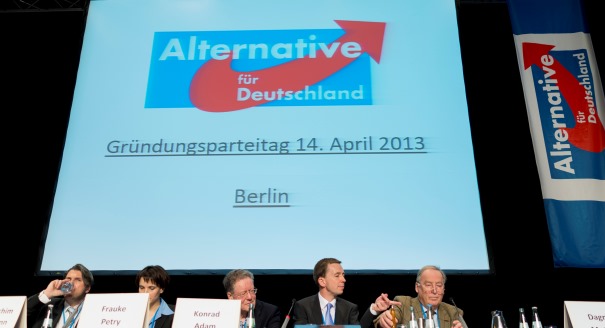Until last week, Angela Merkel, German chancellor since 2005, was in a reasonably comfortable position for September’s federal election.
The polls looked good, suggesting that her center-right coalition might be back for a second term. Her main challenger, the opposition Social Democratic Party’s Peer Steinbrück, was making enough gaffes to be safely ignored.
But now, the emergence of a new party has thrown Berlin into disarray. The Alternative for Germany (AfD), the first Euroskeptical party in Germany that has a real chance at establishing itself, held a very successful rally last weekend in the German capital.
The AfD is a single-issue party: it wants to take Germany out of the euro. Its members are convinced that the eurozone is economically and financially so diverse that it cannot hold together. They want Germany to cease paying for indebted countries. At the same time, they hold the single currency responsible for social misery and anti-German resentment in the countries hardest hit by the eurozone crisis.
Should Merkel be worried? According to the latest polls, a staggering 17 percent of voters say they would consider voting for the AfD—and that is only a week after the party was launched. Even if many potential AfD voters originate from the political left, Merkel’s conservative bloc as well as her junior coalition partner, the Free Democratic Party, stand to lose votes, too. In what is expected to be a tight race, the AfD could make all the difference.
The AfD, after all, has an air of respectability, and it has conservative roots. Its leader, Bernd Lucke, is an economics professor who was a member of Merkel’s Christian Democratic Union for thirty-three years. His team and, so far, the party’s supporters are mostly male, middle-aged or retired professionals. That has allowed Lucke to tap into a deeply held fear that the euro crisis might endanger their savings.
Those fears were strengthened by the recent Cypriot rescue package, which for the first time included making depositors cover a share of the bailout money. That idea shocked many Germans. They saw it as a dangerous precedent, which might lead to similar expropriations elsewhere. In a country such as Germany, where currency reforms or inflation wiped out personal savings several times during the twentieth century, the Cypriot deal touched a raw nerve.
The AfD is now playing the anti-euro card for all it’s worth. But can this German party be against the euro without turning against the idea of European integration? Comparable movements in the Netherlands, Austria, Finland, and nearly every other EU country have built their success on being radically anti-Brussels in every aspect.
Lucke, however, said during the AfD’s founding party congress that it was possible to separate one from the other. “In politics, nothing is irreversible, and least of all the euro. It was a historic mistake, but mistakes can be corrected. If the euro fails, it doesn’t mean that Europe fails.”
Yet, curiously, the latest opinion polls show that German nostalgia for the deutsche mark is waning. In 2002, according to the Allensbach Institute, a polling outfit, 61 percent of those surveyed wanted the old currency back. By 2013, this fell to 37 percent. Furthermore, 68 percent believe that the eurozone is important or very important.
Faced with this situation, Merkel has two options. She can continue as before, keeping a low profile over Germany’s financial contributions to eurozone bailouts, and hoping to keep the euro crisis dormant at least until after the elections.
Or, encouraged by the Allensbach poll, she can finally go on the offensive and explain to the German public why Germany should stick with Europe and the euro. She can tell them why the alternative offered by the AfD endangers not just European integration but also German affluence.
She could remind voters that Germany chose the European path after 1945 in order to rebuild its democracy and anchor it to a Europe based on common values of peace, security, and human rights.
Former chancellor Helmut Kohl, after all, cajoled the Germans into giving up their cherished deutsche mark because the euro was about making the larger, reunified Germany palatable to the rest of Europe. His answer to anti-German fears in other European countries was more, not less, Europe.
The AfD is the first popular movement in Germany to question that rationale. Angela Merkel should grasp this opportunity to do some serious explaining.






.jpg)